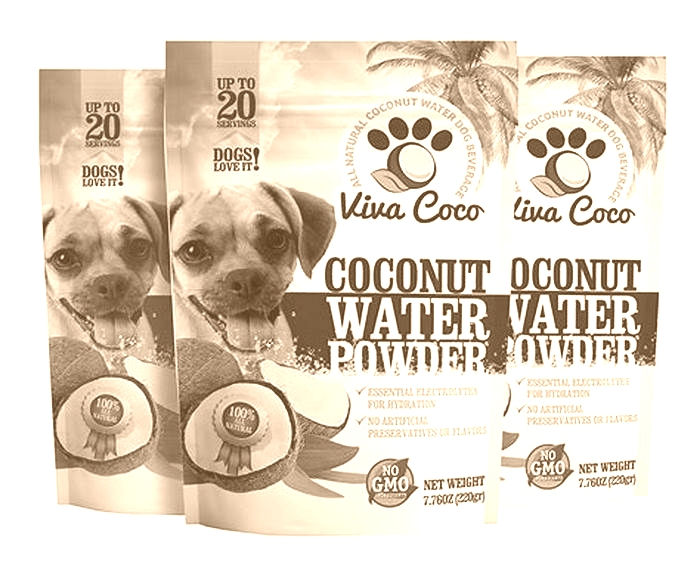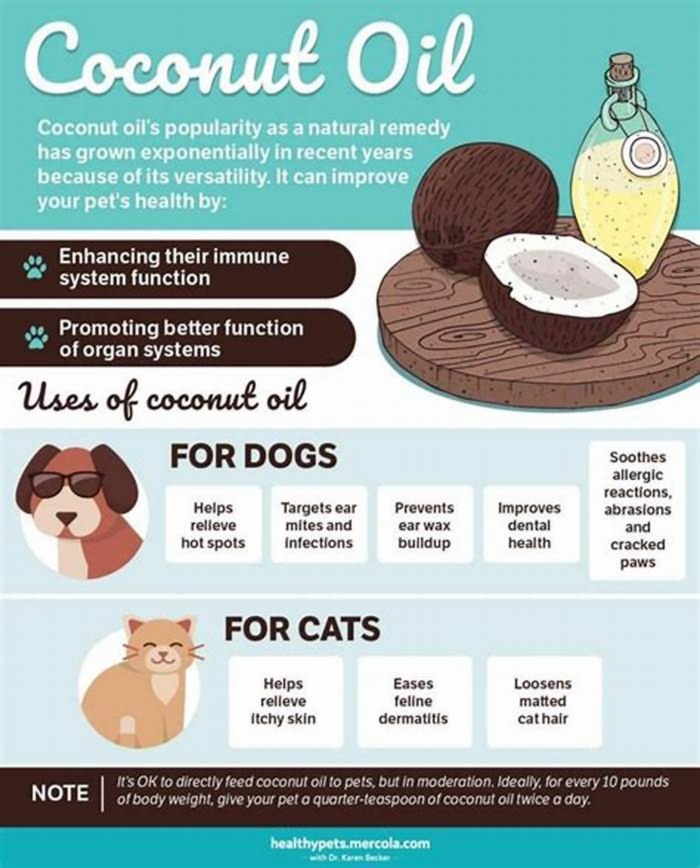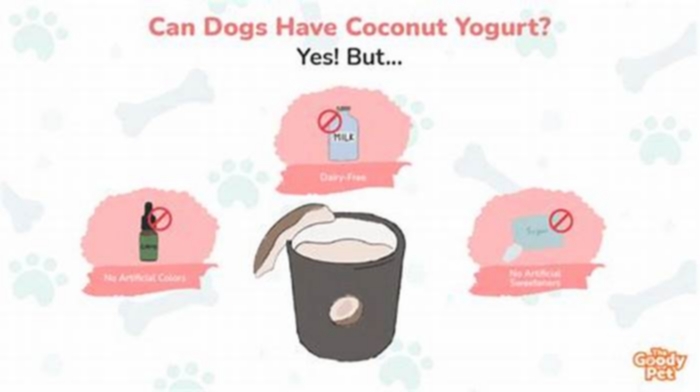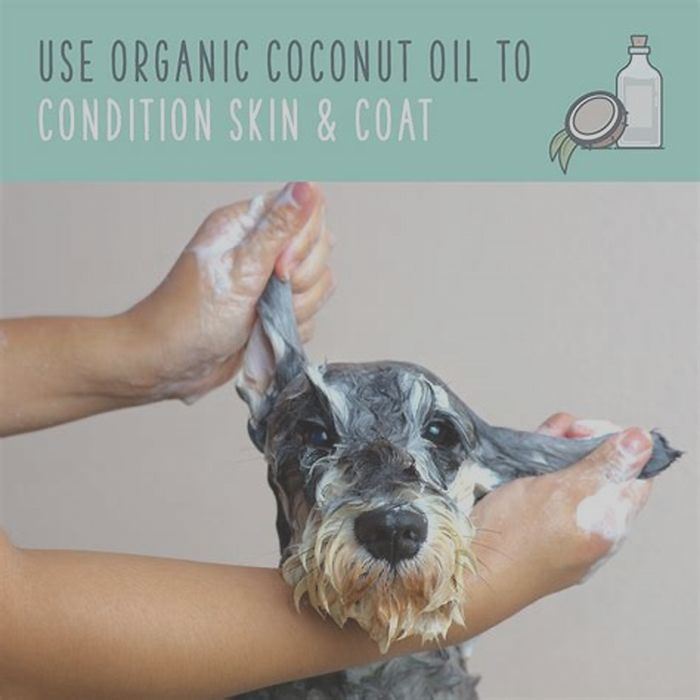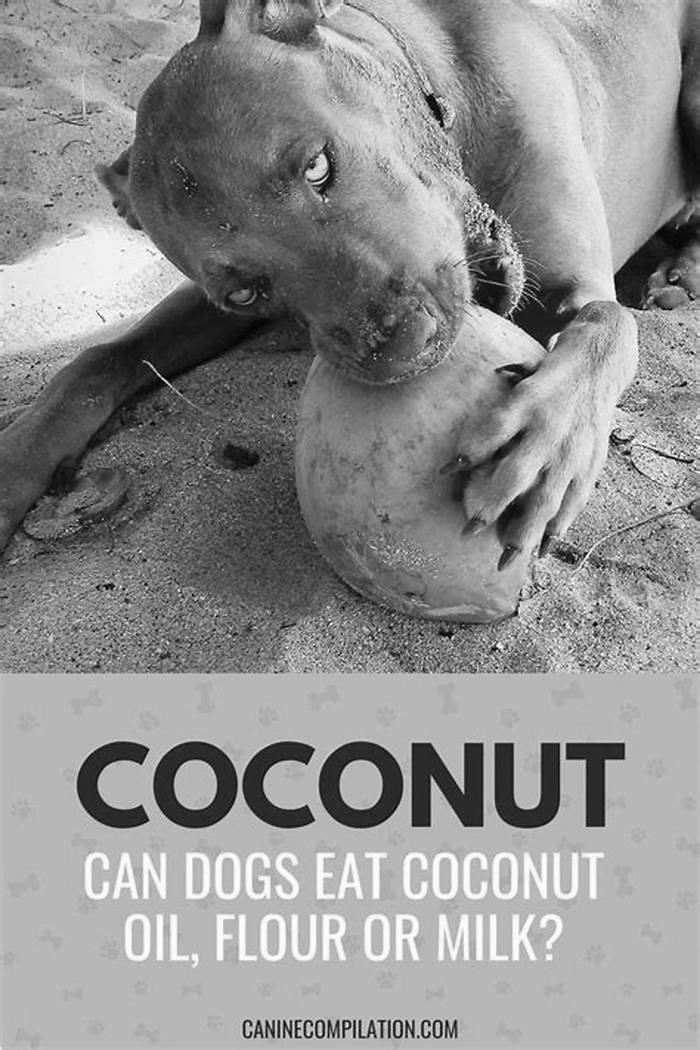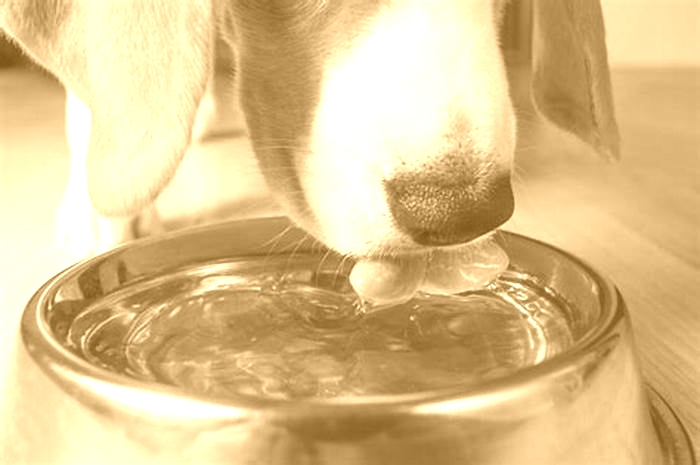Is coconut water good for your dog
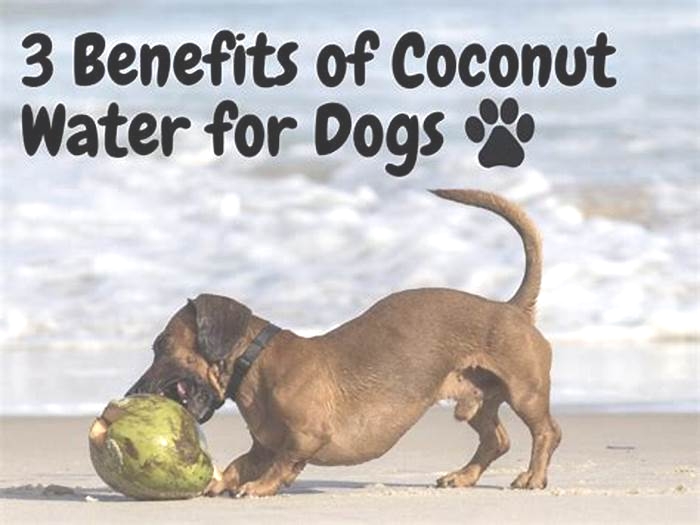
Can Dogs Drink Coconut Water? Everything You Need To Know

Coconut water is sweet, tasty, and replenishes electrolytes, so you may wonder, can dogs drink coconut water? When it comes to human health trends, we often assume that whats good for us is also good for our dogs. So always better to investigate first.
Coconut water should not be confused with milk or oil, which are two different coconut products. The water specifically may benefit dogs with UTIs and kidney stones, but like any human food, we always need to be careful about feeding our dogs anything in excess.
Coconut water can be good for your dogs digestion, especially with supplements like a quality probiotic chew. Here, we cover what makes it good for dogs and any health risks it may have.
So, Can Dogs Drink Coconut Water?
Coconut water is safe and even beneficial for dogs in small quantities. When dogs are exercising intensively, a few teaspoons of coconut water can help them rehydrate. But the high potassium levels can be dangerous to dogs in excess.
So if youre wondering, can dogs drink coconut water everyday?. The answer is no. If dogs have a balanced diet with the right amount of minerals, giving something that can create an excess is dangerous.
However, coconut water is a natural drink and is fine as an occasional treat for your dog. However, while it offers hydration, electrolytes, and other benefits, coconut water can never substitute good old plain water.
Before introducing coconut water into your dogs diet, introduce the beverage gradually. This establishes if your dog can have the drink without creating problems like tummy issues.
What is Coconut Water?
Coconut water is the clear liquid inside the center of green coconuts. It is not the same as milk, which is made with water and coconut meat, and it is not the same as oil, which is the fat or lipids extracted from the coconut.
What Kind of Coconut Water Can Dogs Have?
Dogs can have a small amount of 100% purely natural, additive-free coconut water to enjoy maximum health benefits. However, look for artificial additives in some store-bought products like xylitol, a common sweetener that is toxic to dogs.
Sweetened, xylitol-free coconut water isnt good either because the added sugar can cause health issues like diabetes and obesity. Sticking to the basics and giving your dog the clear liquid directly from fresh coconut is best, although you can still purchase it from the store.
Health Benefits of Coconut Water for Dogs

Coconut water can benefit your pooch due to its anti-inflammatory properties, nutrients, and electrolyte content. Whether you freeze the drink into dog treats or give it to your dog directly, its an asset to your canines health.
1. High in Vitamins and Minerals
This drink has several biologically active components like amino acids, vitamins, and minerals that include:
- Vitamin C Boosts a dogs vitality and is a powerful antioxidant
- B-vitamins These water-soluble vitamins are necessary as coenzymes for enzymatic reactions vital for cellular function
- Potassium Helps in electrical charges of the heart and muscles. Coconut water may be good for dogs with hypokalemia, which is a potassium deficiency. However, a high potassium content can get excessive in dogs (hyperkalemia) if given too much coconut water. If your dog is already ingesting a lot of potassium in their dog food with ingredients like sweet potatoes and liver, be careful. Too much potassium can affect their hearts.
Remember that the ASPCA lists coconut and its products as dangerous to dogs due to high potassium levels.
- Calcium Important for bone health in the right amounts
- Iron Essential for carrying oxygen in the blood
- Zinc Helps a dogs immune system, coat health, and thyroid function
The next time youre from intense exercise with your dog, sneaking them a sip of your coconut water can help them rehydrate. The drink contains five electrolytes a dog needs: potassium, magnesium, phosphorus, sodium, and calcium. But remember, no more than a sip.
While coconut water can make a great isotonic drink, nothing can top normal water for hydration. Because of the small amounts of coconut water recommended, your dog will still likely feel thirsty after drinking it.
2. Anti-Inflammatory Properties Aiding in Eliminating Free Radicals
When dogs exercise, the exercise increases the amount of oxygen they burn, causing oxidative damage (or free radicals), which can damage cells. The micronutrients found in coconut water give it anti-inflammatory properties, supporting your dogs immune system and protecting them from damage.
Eliminating free radicals reduces the chances of arthritis, cancer, and cardiovascular diseases.
3. Improves Digestion
Dogs are famed for their strong stomachs that can handle almost anything, but some dogs do have sensitive stomachs. Dogs can have small amounts cilantro, coconut water, and a dollop of plain yogurt to aid their sensitive stomach as a temporary solution.
This beverage contains monolaurin, a monoglyceride that soothes and cleanses the digestive tract. Additionally, this water is high in manganese which activates enzymes used in metabolism and regulates bowel movements.
4. It May Help Reduce Kidney Stones and UTIs
Kidney stones and urinary tract infections (UTIs) can result in dogs with a low thirst drive or who dont drink enough water. These dogs can benefit from adding a bit of flavor to their drink, which can be achieved with coconut water. More dog-specific studies on the UTI function of coconut water are necessary, but research on humans seems promising.
As a natural diuretic, coconut water can flush out toxins by promoting diuresis (increasing how often a dog needs to pee) and reducing UTIs. High potassium levels in the drink can play a key role in dissolving some kidney stones, reducing their size.
Remember that dogs get different kinds of kidney stones; some need to be removed surgically, and what works to dissolve one kind can cause another. So its vital to have a veterinarian assess any stones in the urinary tract.
Health Concerns of Coconut Water
Unfortunately, dogs should never have too much coconut water. Dogs that frequently take plenty of coconut water are at risk of gastrointestinal issues and hyperkalemia, among other problems. Lets look at some of the risks coconut water may pose to dogs.
1. Gastrointestinal Upset
This is the most common side effect of coconut water in dogs. Dogs with an upset stomach exhibit the following:
- Vomiting;
- Diarrhea;
- Lack of appetite;
- Discomfort; and
- Pacing.
2. Hyperkalemia
Dogs that take too much coconut water can suffer from hyperkalemia due to excessive potassium levels. This is a severe condition thats thankfully rare but requires medical attention. Signs include:
- Vomiting;
- Lethargy;
- Weight loss;
- Dehydration;
- Muscle loss;
- Breathing problems; and
- Paralysis.
3. Obesity
Coconut water has a high-calorie content of about 60 kcal per cup. Coconut water must be kept within your poochs daily caloric allowance to stay within a healthy weight. Excessive coconut water can cause weight gain, then obesity.
Obesity poses major health risks to dogs, including diabetes, high blood pressure, cancer, and heart disease.
How to Give Your Dog Coconut Water: How Much Coconut Water is Okay for Dogs?
The exact amount of coconut water to give your dog isnt a one-size-fits-all, and it varies based on your dogs size. A few ounces every few days a week will suffice. Its essential to introduce the drink gradually in tablespoon amounts to determine if your dog reacts to it.
Some dogs with sensitive stomachs may react negatively to coconut water with an upset stomach. Others are allergic to the drink, although allergies are quite rare.
You Can Serve Your Dog Coconut Water This Way:
- Mix a couple of ounces into their drinking water;
- Give it to your dog directly as a treat; or
- Freeze and give to your dog as a frozen treat.
Can Dogs Have Coconut Milk?
Dogs should not have coconut milk as a regular part of their diet. Remember that coconut products are listed as dangerous to dogs because of the high levels of potassium.
Coconut milk is higher in fat and is a mixture of shredded coconut flesh and water. The greater fat content makes coconut milk risky to your dogs weight when given in large quantities over long periods.
Excessive consumption leads to stomach upset with diarrhea and vomiting.
Can Dogs Drink Coconut Oil Everyday?
Coconut oil is high in fat and shouldnt be taken by dogs every day. Excessive coconut oil will cause stomach upset in dogs and obesity after extended use. A teaspoon for small dogs and a teaspoon for big dogs should be enough for dogs that dont react to coconut oil.
Frequently Asked Questions (FAQS)
Is coconut water good for a dogs skin?
Coconut water may be good for dogs skin and coat. The drink is high in B vitamins that promote coat health and eliminate free radicals that would damage the coat. It also has antibacterial and antifungal properties that support skin health.
Is coconut water good for dogs with UTIs?
Coconut water helps dogs with UTIs by increasing urine production, which flushes out toxins. Additionally, the potassium content in the drink helps dissolve some kidney stones, effectively reducing their size. The drink also encourages dogs with UTIs to drink more water.
Is coconut water good for dogs with parvo?
Parvo causes sick dogs to lose water excessively due to diarrhea and vomiting, which can lead to severe dehydration and death. Dogs recovering from parvo can benefit from coconut water as it replenishes electrolytes in the body, reducing dehydration. But your dog will still need immediate medical treatment.
Is coconut water good for a dogs diarrhea?
Coconut water helps a dog with diarrhea by introducing electrolytes that are lost. If the diarrhea results from indigestion, coconut water reduces it because the drink aids digestion. Other digestive issues like constipation can improve with coconut water and other home remedies aiding dog scooting.
Can coconut water give a dog diarrhea?
Coconut water can cause diarrhea if dogs drink it in large quantities. Gastrointestinal issues are easy to spot and cause vomiting, diarrhea, and reduced appetite. Dogs with sensitive stomachs can have diarrhea even with little coconut water.
Final Thoughts
Dogs can safely drink coconut water and enjoy benefits like rehydration, better digestion, and nutrition. Coconut consumption should be controlled in dogs to prevent gastrointestinal issues and obesity due to its high fat content. Coconut oil and milk are other coconut by-products that benefit dogs in small quantities.
Meet Your Experts
Tamsin De La Harpe
Author
Tamsin de la Harpe has nearly two decades of experience with dogs in rescue, training, and behavior modification with fearful and aggressive dogs. She has worked closely with veterinarians and various kennels, building up extensive medical knowledge and an understanding of canine health and physiology. She also spent two years in the animal sciences as a canine nutrition researcher, focusing on longevity and holistic healthcare for our four-legged companions.Tamsin currently keeps a busy homestead with an assortment of rescue dogs and three Bullmastiffs.
Tamsin de la Harpe has nearly two decades of experience with dogs in rescue, training, and behavior modification with fearful and aggressive dogs. She has worked closely with veterinarians and various kennels, building up extensive medical knowledge and an understanding of canine health and physiology. She also spent two years in the animal sciences as a canine nutrition researcher, focusing on longevity and holistic healthcare for our four-legged companions.Tamsin currently keeps a busy homestead with an assortment of rescue dogs and three Bullmastiffs.
Can Dogs Eat Coconut?
NOTE: Always check with your veterinarian first before giving your dog any new foods, especially people foods. What might be OK for one dog might not be good for your dog, depending on multiple factors, such as their age, health history, health conditions, and diet. Dogs on prescription diets should not be fed any food or treats outside the diet.
Is Coconut Good for Dogs?
Coconuts are not toxic to dogs. In fact, some coconut elements (such as coconut meat and coconut oil) can be healthy for dogsin moderation.
Coconuts contain antioxidants that can boost a pups immune system. The fruit is also high in lauric acid, a medium-chain fatty acid that helps fight off viruses, such as canine influenza. Coconuts also offer bone-health benefits, as they are rich in magnesium.
But that doesnt mean you should give your dog coconut as an everyday treat. Coconuts are a source of saturated fat, which can give your dog an upset stomach. But if you drop a piece of coconut meat or a splash of coconut milk on the floor and your dog laps it up, they should be fine.
Before introducing anything new into your pets diet, consult with your veterinarian.
What Coconut Products Can Dogs Have?
Coconut Meat
Coconut meat for dogs is just as delicious for them as it is for us. However, when feeding your dog coconut meat, treat it as, well, a treat, and only add a few flakes to top their food.
Coconut Oil
Coconut oil is likely safe in very small quantities (like as a helpful lubricant for giving a dog pills) unless your dog is prone to GI issues or pancreatic disease. But be very conservative in how much you give, as too much coconut oil can cause doggy diarrhea.
But you can safely use coconut oil on your dog topicallyfor example, applying it to chapped paw pads and using it on their coat to help keep it shiny.
Coconut Water
Coconut Milk
Who can resist a breakfast cereal topped with a splash of coconut milk?
Coconut Husk
While the juicy white meat of a coconut is OK, the hard outer husk is a different story. Coconut husks can easily be a choking hazard or cause an intestinal blockage, so never give one to your pup to chew on.
How Much Coconut Can Your Dog Eat Safety?
Again, treats of any kind (including coconut) should only make up 10% of a dogs daily caloric intake. The other 90% should come from a well-balanced dog food diet.
Extra-small dog (220 pounds):1/8 teaspoon of coconut meat per day
Small dog (2130 pounds):1/2 teaspoon of coconut meat per day
Medium dog (3150 pounds):1/2 teaspoon of coconut meat per day
Large dog (5190 pounds):11 teaspoon of coconut meat per day
Extra-large dog (91+ pounds): 11 teaspoon of coconut meat per day
How to Feed Your Dog Coconut
1. To Coat Pills
If your dog has figured out that youre hiding pills in the peanut butter, you can try using coconut oil instead.
2. As a Food Topper
One to two small pieces of coconut meat on top of your dogs food is a simple way to introduce the fruitand the health benefitsto your dog.
3. Baked in a Dog-Friendly Recipe
If baking is your favorite pastime, there are endless coconut-inspired dog treat recipes to bake. Some fun ones to try are turmeric and coconut dog treats and springtime pup-cakes.
WRITTEN BY
Katelyn Chef
Freelance Writer


